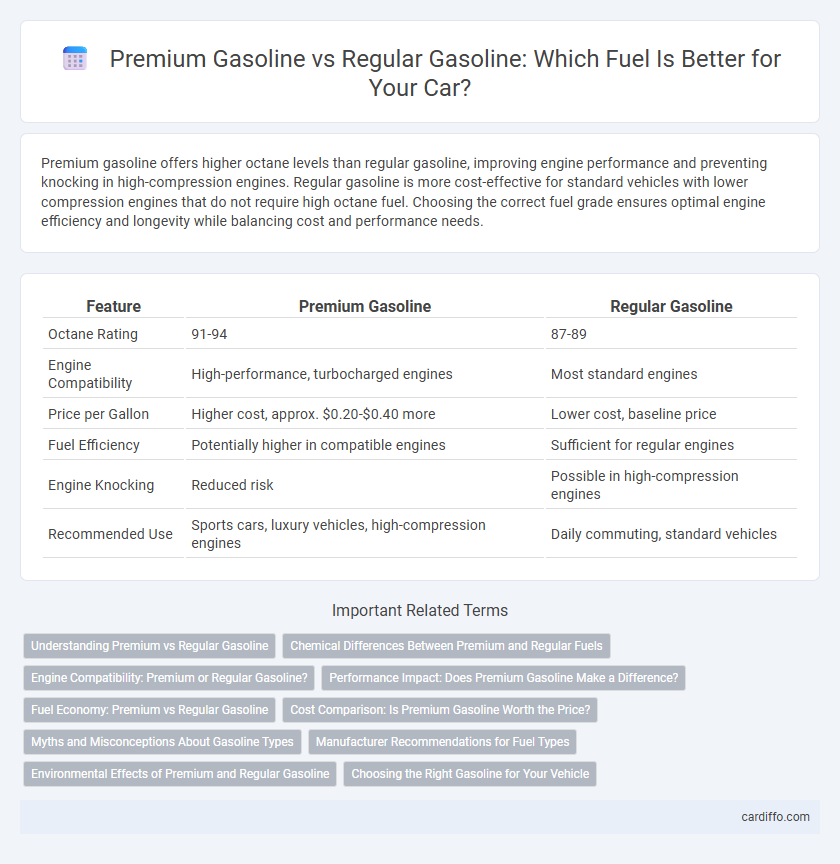Premium gasoline offers higher octane levels than regular gasoline, improving engine performance and preventing knocking in high-compression engines. Regular gasoline is more cost-effective for standard vehicles with lower compression engines that do not require high octane fuel. Choosing the correct fuel grade ensures optimal engine efficiency and longevity while balancing cost and performance needs.
Table of Comparison
| Feature | Premium Gasoline | Regular Gasoline |
|---|---|---|
| Octane Rating | 91-94 | 87-89 |
| Engine Compatibility | High-performance, turbocharged engines | Most standard engines |
| Price per Gallon | Higher cost, approx. $0.20-$0.40 more | Lower cost, baseline price |
| Fuel Efficiency | Potentially higher in compatible engines | Sufficient for regular engines |
| Engine Knocking | Reduced risk | Possible in high-compression engines |
| Recommended Use | Sports cars, luxury vehicles, high-compression engines | Daily commuting, standard vehicles |
Understanding Premium vs Regular Gasoline
Premium gasoline contains a higher octane rating, typically 91-93, compared to regular gasoline's 87-89, making it better suited for high-performance or turbocharged engines to prevent knocking. The higher octane in premium fuel allows for more efficient combustion and can enhance engine power and efficiency in vehicles designed for it. However, most standard engines run optimally on regular gasoline, with minimal performance gain from using premium fuel, impacting fuel costs without significant benefits.
Chemical Differences Between Premium and Regular Fuels
Premium gasoline contains a higher octane rating, typically 91 to 93, compared to regular gasoline's 87 to 89, which enhances its resistance to engine knocking. The chemical difference lies in the molecular structure; premium fuels have more branched-chain hydrocarbons and aromatic compounds that improve combustion stability. This optimized chemical composition allows premium gasoline to perform better in high-compression engines, reducing pre-ignition and improving overall engine efficiency.
Engine Compatibility: Premium or Regular Gasoline?
Premium gasoline contains higher octane levels, typically 91-94, which prevents engine knocking in high-performance engines designed for higher compression ratios. Regular gasoline, with octane ratings around 87, is suitable for most standard engines and provides efficient combustion without causing knocking. Using premium gasoline in engines not designed for it generally offers no added performance or fuel economy benefits.
Performance Impact: Does Premium Gasoline Make a Difference?
Premium gasoline has a higher octane rating than regular gasoline, which helps prevent engine knocking in high-performance and turbocharged engines. Vehicles designed to take advantage of premium fuel often experience improved acceleration, smoother operation, and enhanced fuel efficiency. For most standard engines, however, using premium gasoline does not result in noticeable performance gains and regular gasoline is sufficient.
Fuel Economy: Premium vs Regular Gasoline
Premium gasoline typically contains a higher octane rating, which helps prevent engine knocking in high-performance vehicles and can slightly improve fuel economy in engines designed for premium fuel. Regular gasoline, with a lower octane rating, is suitable for most standard engines and generally offers comparable fuel efficiency without added cost. Using premium fuel in vehicles not requiring it rarely results in significant fuel economy gains, making regular gasoline the more cost-effective choice for everyday driving.
Cost Comparison: Is Premium Gasoline Worth the Price?
Premium gasoline typically costs 15-30% more per gallon than regular gasoline, with prices averaging around $0.40 to $0.60 higher depending on location and market conditions. Despite the higher price, regular gasoline provides adequate performance for most vehicles without high-compression engines or turbochargers, making premium fuel unnecessary and less cost-effective for typical daily drivers. Choosing premium gasoline may benefit high-performance or luxury cars designed for it, but for standard vehicles, the extra cost rarely translates into proportional fuel efficiency or engine longevity gains.
Myths and Misconceptions About Gasoline Types
Premium gasoline is often believed to improve engine performance and fuel efficiency in all vehicles, but it is specifically designed for high-compression engines that require higher octane to prevent knocking. Regular gasoline with an octane rating of 87 suits most cars, as using premium fuel in engines designed for regular gasoline does not provide significant benefits and results in unnecessary expense. Misconceptions include the idea that premium fuel cleans the engine better or boosts mileage when in reality, fuel quality standards for regular gas ensure adequate performance and cleanliness for standard engines.
Manufacturer Recommendations for Fuel Types
Manufacturers specify fuel types to optimize engine performance and longevity by recommending premium gasoline for high-compression engines and turbocharged models requiring higher octane levels to prevent knocking. Regular gasoline, typically with an octane rating of 87, suffices for most standard engines designed to handle lower compression without performance loss. Following these manufacturer guidelines ensures optimal fuel efficiency, reduced emissions, and adherence to warranty conditions.
Environmental Effects of Premium and Regular Gasoline
Premium gasoline typically contains higher octane levels and additives that can promote more complete combustion, potentially reducing some emissions compared to regular gasoline. However, both premium and regular gasoline produce significant amounts of carbon dioxide, nitrogen oxides, and particulate matter, contributing to air pollution and climate change. The environmental impacts are largely driven by fuel consumption and engine efficiency rather than the octane rating alone.
Choosing the Right Gasoline for Your Vehicle
Selecting the appropriate gasoline for your vehicle depends on the manufacturer's recommendations and engine requirements. Premium gasoline offers a higher octane rating, which helps prevent engine knocking and improves performance in high-compression engines, while regular gasoline is suitable for most standard vehicles with lower compression engines. Using the recommended fuel enhances engine efficiency, reduces emissions, and extends the lifespan of your vehicle's engine components.
Premium Gasoline vs Regular Gasoline Infographic

 cardiffo.com
cardiffo.com